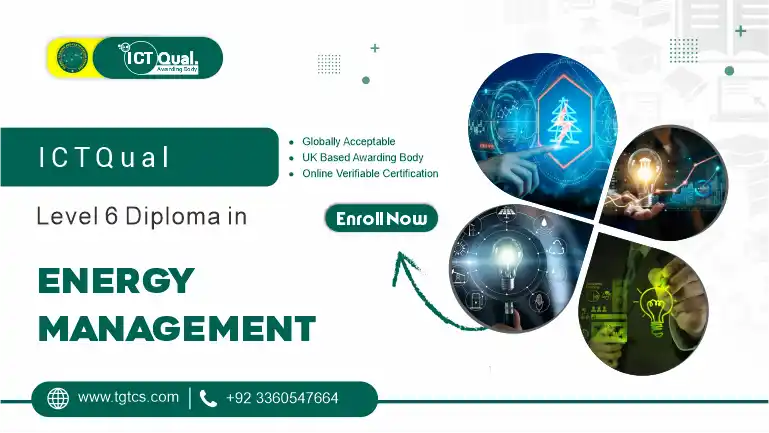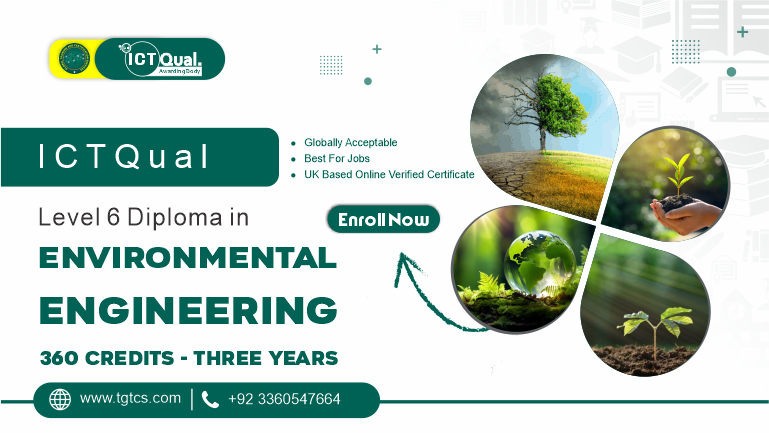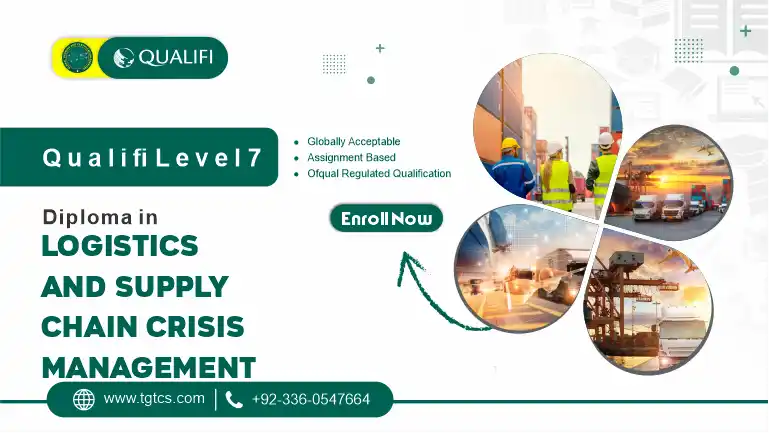ICTQual Level 6 Diploma in Energy Management
As the global focus on sustainability intensifies, the demand for skilled professionals in energy management is growing. The ICTQual Level 6 Diploma in Energy Management is designed to equip individuals with the essential knowledge and skills needed to effectively manage energy resources in various sectors. This diploma serves as a critical stepping stone for those looking to make a significant impact in the field of energy management and sustainability.
The ICTQual Level 6 Diploma in Energy Management is a comprehensive qualification aimed at developing a foundational understanding of energy management principles and practices. This diploma lays a solid foundation for further studies in energy management or related fields. It prepares you for advanced qualifications, such as the ICTQual Level 7 Diploma or other specialized certifications.
The program emphasizes practical learning through case studies, real-world projects, and interactive sessions. This hands-on approach helps you apply theoretical knowledge to real-world challenges in energy management. Enrolling in this diploma allows you to connect with a community of professionals, educators, and industry leaders. Building a strong network can lead to valuable collaborations and career opportunities.
The ICTQual Level 6 Diploma in Energy Management is an essential qualification for anyone looking to enter the energy management field or enhance their current skill set. By equipping yourself with the knowledge and tools to manage energy resources effectively, you’ll contribute to sustainability efforts and drive positive change in your organization and community.
Don’t miss this opportunity to advance your career and play a vital role in shaping a sustainable energy future—enroll in the ICTQual Level 6 Diploma in Energy Management today!
The Global Training and Certification Services (TGTCS) is Directly Approved Training Centre of ICTQual
The ICTQual Level 6 Diploma in Energy Management is a comprehensive training program designed for professionals seeking to deepen their expertise in energy management.
This diploma focuses on advanced topics such as energy policy, regulatory frameworks, and sustainable practices, equipping participants with the skills to implement effective energy management systems and drive efficiency in their organizations.
Key features of the course include in-depth modules on energy audits, financial analysis, and renewable energy solutions, along with practical applications through case studies.
Ideal for energy managers, sustainability professionals, and facility managers, this diploma enhances career opportunities and fosters a network of industry connections.
By completing this program, participants are well-prepared to contribute to organizational sustainability efforts and make informed decisions in the energy sector.
Mandatory Units
- Introduction to energy management
- Technical and Operational
- Behavioural Change and Motivation
- Waste Management
- Procurement
- Energy Assessments, Measurements and Verification
- Regulatory & Legal Compliance and Carbon Management
- Strategy/Plan in energy management
- Understand Energy Management Principles
Demonstrate a comprehensive understanding of energy management concepts, including energy policy, regulations, and standards relevant to different sectors. - Conduct Energy Audits
Effectively perform energy audits to assess energy consumption patterns, identify inefficiencies, and recommend actionable improvements. - Implement Energy Management Systems
Design and implement energy management systems in alignment with ISO 50001 standards, ensuring continuous improvement in energy performance. - Analyze Financial Implications
Evaluate the financial aspects of energy management projects, including cost-benefit analysis and investment appraisal, to support decision-making. - Explore Renewable Energy Solutions
Investigate and assess various renewable energy technologies, understanding their application and integration within existing energy systems. - Develop Sustainability Strategies
Create and propose sustainable energy management strategies that align with organizational goals and contribute to reducing carbon footprints. - Communicate Effectively
Develop strong communication skills to articulate energy management concepts and strategies to stakeholders at all levels of an organization. - Collaborate and Lead
Work collaboratively in teams and demonstrate leadership skills in implementing energy management initiatives and fostering a culture of sustainability. - Stay Informed on Industry Trends
Keep abreast of emerging trends, technologies, and best practices in energy management and sustainability to remain competitive in the field. - Conduct Research and Analysis
Employ research methods to gather data and analyze energy usage patterns, leading to informed recommendations for energy efficiency improvements.
These outcomes ensure that graduates are equipped with the knowledge and skills necessary to excel as energy managers and contribute effectively to organizational sustainability efforts.
- Career Advancement
Earning this diploma positions you for advanced roles in energy management, enhancing your professional credibility and making you a competitive candidate in the job market. - Comprehensive Skill Development
The course provides in-depth knowledge of energy management principles, enabling you to implement effective strategies and practices in various organizational settings. - Practical Application
Through case studies and real-world projects, you’ll gain hands-on experience that allows you to apply your learning directly to your workplace, ensuring immediate impact. - Networking Opportunities
Join a community of industry professionals, fostering valuable connections that can lead to collaborations, mentorship, and new job opportunities. - Understanding of Regulatory Frameworks
Gain insights into relevant energy policies and regulations, ensuring your organization remains compliant while optimizing energy use. - Financial Acumen
Develop the ability to analyze the financial implications of energy projects, helping you advocate for investments that promote energy efficiency and sustainability. - Focus on Sustainability
Learn how to create and implement sustainable energy strategies that align with global efforts to reduce carbon emissions and promote environmental stewardship. - Leadership Development
Build leadership and collaboration skills that empower you to lead energy initiatives and engage stakeholders effectively within your organization. - Adaptability to Industry Trends
Stay informed about the latest trends and technologies in energy management, preparing you to adapt and innovate in a rapidly changing field. - Pathway to Professional Certification
The diploma serves as a stepping stone toward further certifications in energy management, enhancing your qualifications and expertise.
By completing the ICTQual Level 6 Diploma in Energy Management, you will be well-equipped to drive meaningful change in your organization and contribute to a more sustainable future.
The ICTQual Level 6 Diploma in Energy Management is designed for a diverse range of professionals. The ideal learner typically includes:
- Energy Managers
Individuals currently working as energy managers seeking to enhance their expertise and advance their careers by gaining a deeper understanding of strategic energy management. - Sustainability Professionals
Those involved in sustainability initiatives within organizations who wish to integrate energy efficiency into their projects and practices. - Facility Managers
Professionals responsible for managing building operations and maintenance who want to improve energy performance and reduce operational costs. - Environmental Consultants
Consultants focused on environmental impact who aim to broaden their knowledge in energy management to better serve their clients. - Policy Makers and Regulators
Individuals involved in developing and implementing energy policies who seek to understand the practical aspects of energy management. - Engineers and Technicians
Professionals in engineering or technical roles looking to expand their skill set and contribute more effectively to energy management initiatives. - Recent Graduates
Graduates from environmental science, engineering, or business programs who are interested in entering the field of energy management. - Corporate Executives
Leaders and decision-makers aiming to foster a culture of sustainability within their organizations by understanding the importance of energy management. - Entrepreneurs in the Energy Sector
Individuals looking to start or grow a business focused on energy efficiency or renewable energy solutions. - Lifelong Learners
Anyone with a passion for sustainability and energy management who is eager to enhance their knowledge and skills for personal and professional growth.
Overall, the ideal learner is motivated, has a foundational understanding of energy concepts, and is eager to make a significant impact in their organization and the broader community through effective energy management practices.
The ICTQual Level 6 Diploma in Energy Management is structured to facilitate a progressive learning experience, allowing participants to build their knowledge and skills step by step. Here’s an outline of the feature progression throughout the course:
1. Introduction to Energy Management
- Overview of Energy Management Principles: Understanding the fundamentals of energy use and its significance in sustainability.
- Key Terminology: Familiarization with essential terms and concepts in energy management.
2. Regulatory and Policy Frameworks
- Energy Policy Understanding: Exploring local and global energy policies and their impact on organizations.
- Compliance Requirements: Learning about regulatory frameworks and standards, including ISO 50001.
3. Energy Audits and Assessments
- Conducting Energy Audits: Gaining practical skills in performing energy audits and assessments.
- Data Collection and Analysis: Learning techniques for gathering and analyzing energy consumption data.
4. Implementation of Energy Management Systems
- Designing Energy Management Systems: Developing knowledge of creating systems in line with best practices.
- Monitoring and Evaluation: Understanding how to track energy performance and make necessary adjustments.
5. Financial Analysis and Project Management
- Cost-Benefit Analysis: Learning to evaluate the financial viability of energy projects.
- Investment Appraisal: Gaining skills in assessing funding options and managing budgets for energy initiatives.
6. Renewable Energy Technologies
- Exploration of Renewable Solutions: Understanding various renewable energy technologies and their applications.
- Integration Strategies: Learning how to incorporate renewable energy sources into existing energy systems.
7. Sustainable Energy Strategies
- Developing Sustainability Plans: Creating actionable strategies for improving energy efficiency and sustainability.
- Stakeholder Engagement: Learning to communicate and collaborate effectively with stakeholders to implement energy initiatives.
8. Leadership and Management Skills
- Building Leadership Qualities: Developing skills to lead energy management teams and initiatives.
- Change Management: Understanding how to manage organizational change in the context of energy projects.
9. Research and Best Practices
- Conducting Industry Research: Gaining skills in researching energy management trends and technologies.
- Case Studies and Real-World Applications: Analyzing successful energy management implementations in various sectors.
10. Final Assessment and Certification
- Comprehensive Evaluation: Completing assessments that demonstrate knowledge and practical skills acquired throughout the course.
- Certification Achievement: Obtaining the ICTQual Level 6 Diploma, validating your expertise in energy management.
This structured progression ensures that learners develop a holistic understanding of energy management, equipping them with the necessary tools and skills to succeed in their roles and contribute effectively to sustainability initiatives.
Course Overview
Course Level
Level 6
Course Units
08 Mandatory Units
Duration
6 to 18 Months






